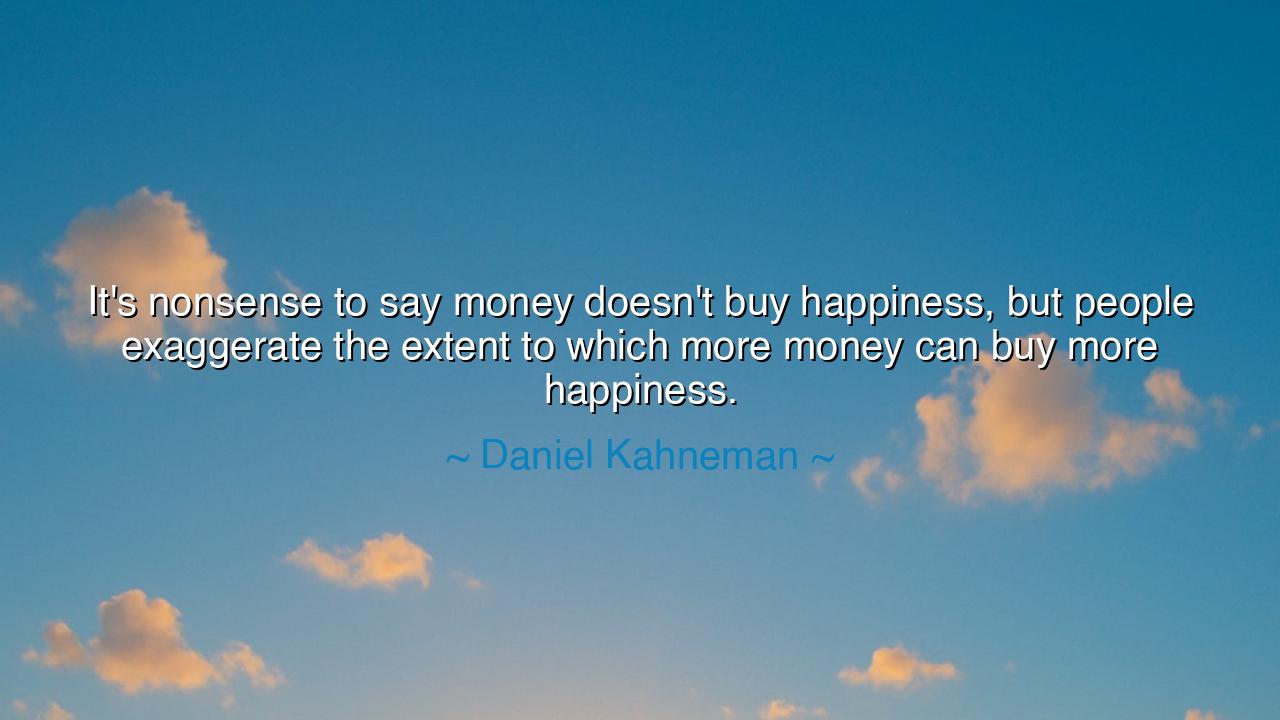
It's nonsense to say money doesn't buy happiness, but people
It's nonsense to say money doesn't buy happiness, but people exaggerate the extent to which more money can buy more happiness.






The words of Daniel Kahneman, “It’s nonsense to say money doesn’t buy happiness, but people exaggerate the extent to which more money can buy more happiness,” arise from the wisdom of a man who has peered deeply into the mind’s hidden chambers. Kahneman, a master of human psychology and a student of behavior, spoke not as a cynic but as a seer—one who understands both the material and the spiritual threads that weave the fabric of human joy. His words strike the balance between two extremes: those who worship money as the fountain of bliss, and those who despise it as a curse upon the soul. In this single statement, he restores balance to the ancient question—can wealth bring happiness? His answer is both humble and profound: yes, but only to a point.
For what is money but a tool—a vessel of exchange, a means of survival, a shield against the harshness of the world? To say it brings no happiness is to deny the comfort it provides, the freedom it affords, the relief it brings from hunger and fear. The poor man who earns enough to feed his children feels a joy purer than gold itself. The mother who no longer worries about tomorrow’s meal knows the peace of security. Money does buy happiness, in that it removes the daily pain of want. But once those needs are met—once the body is safe and the home is warm—wealth begins to lose its power over joy. Beyond sufficiency, abundance becomes noise, and the heart, though surrounded by treasures, begins to starve for meaning.
Kahneman’s insight was born not of poetry but of science. Through years of study, he uncovered what the ancients already knew: that the human heart adapts quickly to comfort. The mansion that once inspired awe soon becomes ordinary. The fine meal, repeated, loses its savor. And the man who once thought joy would come with riches discovers that desire is endless—that each new possession births a new emptiness. The philosopher Epicurus taught the same truth two thousand years before: that happiness lies not in luxury, but in the freedom from need. Wealth, he said, should serve the body’s simplicity and the soul’s peace—not enslave them. Kahneman’s words echo this eternal wisdom, clothed in the language of modern reason.
Consider the life of Andrew Carnegie, the steel magnate who amassed one of the greatest fortunes of his time. In his youth, born to poverty, each coin he earned filled him with gratitude and hope. But as his riches grew, so did his restlessness. It was only when he turned from accumulating to giving—founding libraries, universities, and institutions for the public good—that he rediscovered joy. He wrote that "the man who dies rich dies disgraced," realizing that wealth hoarded was a burden, but wealth used for others was liberation. His life illustrates Kahneman’s truth: money buys happiness only when it serves a purpose beyond the self.
There is also a subtler wisdom hidden in this quote: that happiness cannot be measured by quantity. The first steps out of poverty bring immense joy; the next steps, smaller joys; the final steps, almost none. The rich man, chasing more wealth, finds only diminishing returns. He multiplies his possessions but divides his peace. He buys finer things but feels no finer within. The problem is not money itself—it is the illusion that “more” will forever bring “better.” In this illusion lies the suffering of modern man, who confuses the fullness of his wallet with the fullness of his heart.
The lesson, then, is not to reject wealth, but to rule it wisely. Let money serve your needs, not your identity. Earn it with honor, use it with compassion, and never let it become your master. Seek first the kind of happiness that no coin can purchase—the peace of honest work, the love of family, the beauty of art, the serenity of nature, the quiet of the spirit. If fortune comes to you, be grateful; if it passes you by, do not grieve, for happiness, though aided by comfort, is born from gratitude, not possession.
So, O seeker of truth, remember Kahneman’s wisdom: that happiness is not free from the material world, but neither is it chained to it. Money can ease the body, but only virtue can heal the soul. Let your pursuit of wealth be guided by purpose, not greed. Let your joy depend on gratitude, not gain. For the richest man is not he who owns the most, but he who needs the least—and the happiest life is not the life without money, but the life where money has lost its power to rule.
In this way, you shall walk the golden middle path—the path where comfort meets contentment, where ambition bows to wisdom, and where, in the quiet simplicity of enough, the heart finds its truest and most lasting happiness.






AAdministratorAdministrator
Welcome, honored guests. Please leave a comment, we will respond soon